This post may contain affiliate links. Please see our disclosure policy for more details.
Here’s a comprehensive guide on sugar for babies and toddlers, covering the ideal time for introduction, recommended amounts, and healthier alternatives.
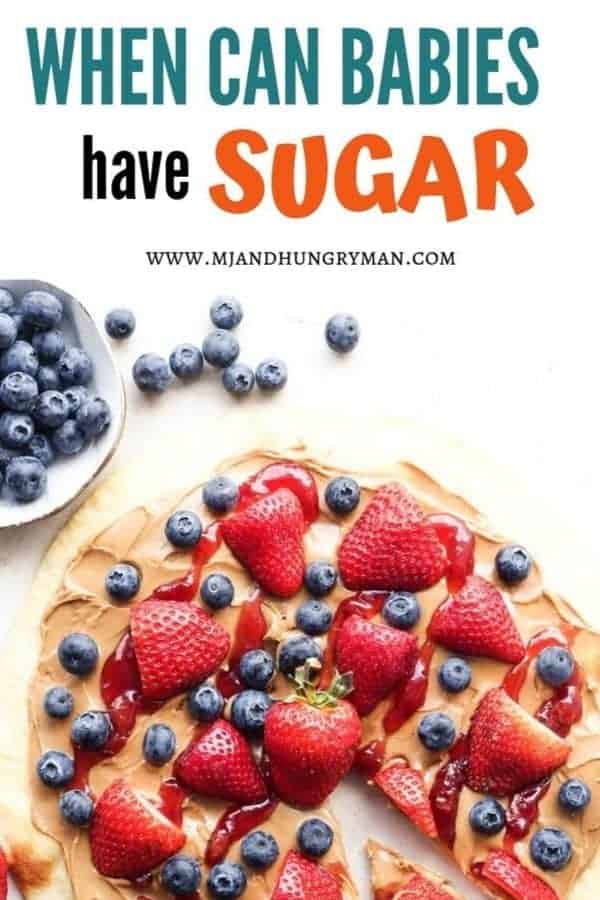
Sugar for Babies
As you may have noticed, I work really hard to keep this is a judgment free zone. Therefore, I want to start with this important message – This post is not meant to make you feel guilty or ashamed in any way if you’ve introduced sugar earlier than the recommendation.
But as always, I want to provide you with evidence-based nutrition advice so that you can make a well-informed decision that’s best for you and your family!
Table of Contents
Fruits for Babies
Fruits are such wonderful sources of vitamins, minerals, antioxidants, and fiber and can be introduced to your baby as soon as they are ready to start solids. Be sure to grab my free handout (click below) to ensure you start at the most optimal time.

Is your baby 6 months old and up?
Learn all the secrets to starting solids safely while optimizing nutrition!
Juice for Babies
The American Academy of Pediatrics recommends that juice should not be introduced until at least 1 year of age. While the only ingredient in the juice may be fruit, it is a very concentrated source of sugar, and it also lacks fiber, which helps slow down the absorption of sugar in the body.
It’s also much easier to over-consume, which may lead to malnutrition, diarrhea, abdominal distention, and tooth decay. So there really is no need to rush to introduce fruit juice.
Focus on offering whole fruits. If you really want to introduce it, then you can dilute it with water. Keep in mind, 1-3 year olds should be limited to no more than 4 ounces a day.
Added Sugars for Babies
What are added sugars?
They are sugars that are added to foods or drinks during processing. This doesn’t include sugars that are naturally found in foods, such as fruits, vegetables, and dairy products (e.g. milk, yogurt).
Here are some some examples of added sugars commonly listed in the ingredients.
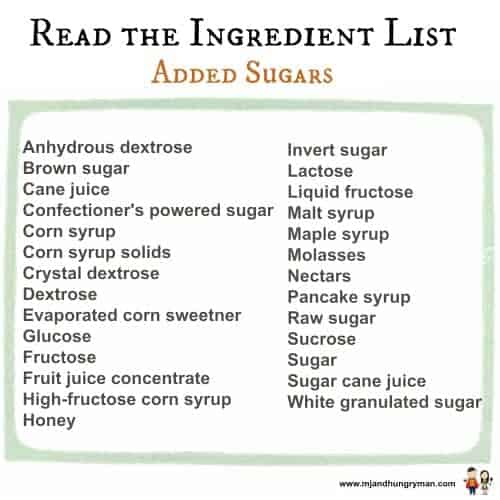
When can babies have added sugars?
The American Heart Association updated their recommended sugar intake to say that kids under 2 should avoid eating or drink any added sugars.
For children ages 2-18 years, the recommendation is no more than 25 grams or 6 teaspoons of sugar per day.
I do want to point out that it’s nearly impossible to avoid added sugars until 2 years of age. Added sugars are found in a lot of foods that aren’t sweet, like bread, crackers, tortillas, spaghetti sauce, etc. So it’s most likely that your baby or toddler has already had them.
What I like to encourage parents is to read the labels on packaged products and try to limit as much as possible without losing your sanity.
Honey and Baby
Absolutely NO honey before 1. This also applies to baked goods. Don’t do it! Why? Because it contains clostridium botulinum spores, which can colonize in infants immature gut, which will lead to botulism.
Reasons to Avoid Added Sugars Before Age 2
- It contains too many calories without any nutritional benefit. Babies have TINY tummies so filling their bellies with sugary foods can leave very little room for wholesome foods, like fruits, veggies, and whole grains. This is especially concerning when they crowd out foods that provide essential nutrients, like iron and zinc, during this critical developmental stage.
- The first 1000 days of life is so so important l in setting the foundation for healthy eating habits. Research shows that early exposure to sugary (or other highly palatable) foods may lead to increased preference for them as well as a preference for higher levels of sugar in foods as they grow older.
- Children who eat too many sweets tend to eat fewer healthy foods and the likelihood of them developing risk factors for heart disease, such as obesity and elevated blood pressure, rises.
- Leads to increased risk for cavities.
Simple Sugar Swaps for Babies
- Instead of juice, offer soft fruits
- Instead of ice cream, serve whole milk plain yogurt with fruit(s) or flavored yogurt, like this blueberry yogurt, strawberry yogurt, and mango yogurt.
- Instead of sugary cereal, offer those that contain very little to no added sugars. Here are the best healthy cereals for babies and kids.
- Instead of using sugar, maple syrup, or other added sugars in baking, use fruits – like banana, unsweetened applesauce, dried fruits with no added sugars, date syrup, etc.
Recipe Collections without Added Sugars
Final Thoughts
I know it’s SO difficult to avoid sugar when it’s all around us. But knowing what you now know, try to avoid offering juice and foods with added sugars as much as possible.
If your baby has already had these foods, please please don’t feel too guilty or be hard on yourself.
Focus on the changes you can make moving forward. And remember to use your baby’s lack of awareness to your advantage.
It will become much more challenging to refrain from sugar completely (which I don’t recommend doing anyway) once they reach around 2 years of age.
And here are some tips on how to handle sugar for toddlers and older children!


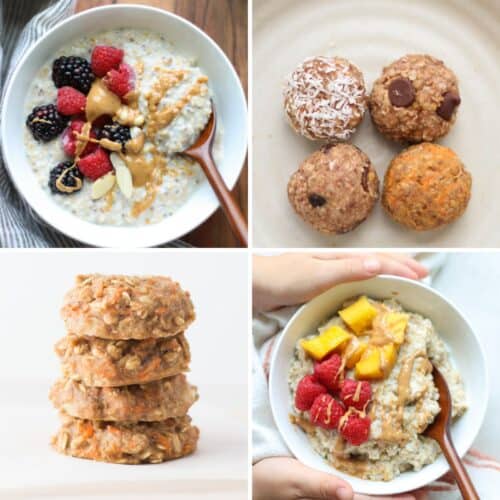
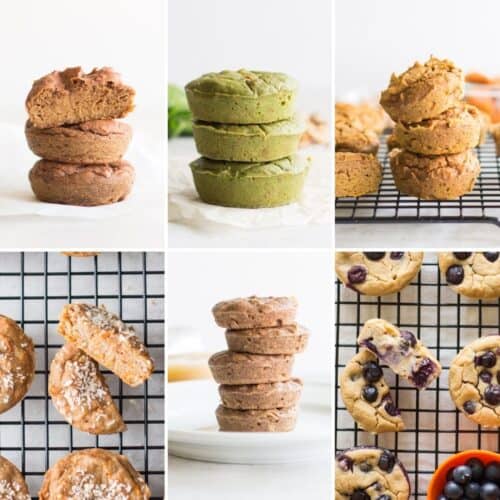
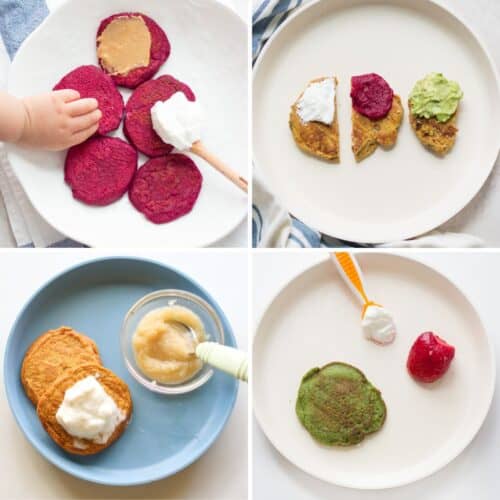
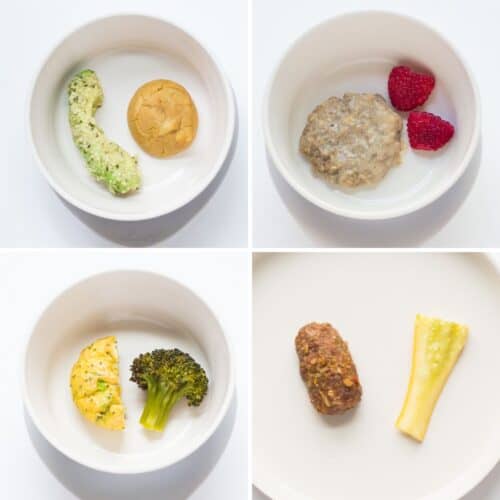


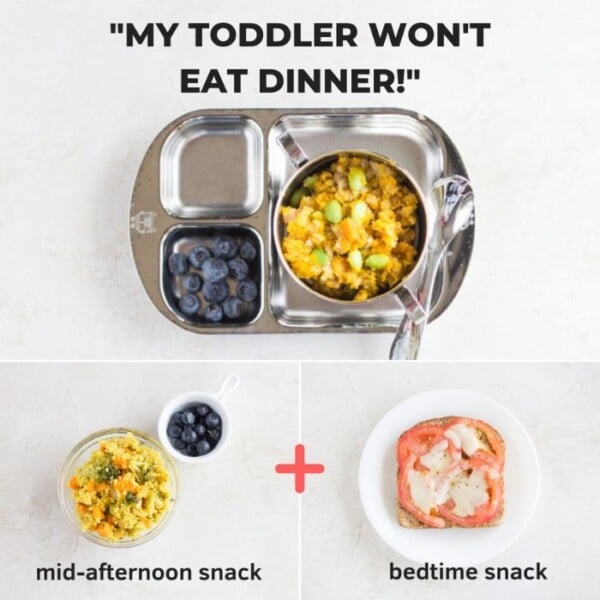
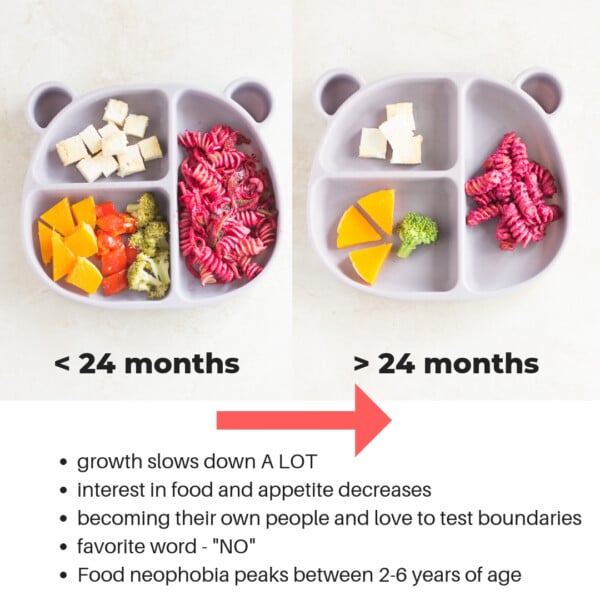









Thanks for a great article, you often recommend honey in place of sugar, I have 2 toddlers, but I’m struggling with which brand of honey to purchase. Do you have a recommendation?
I like to purchase ones from my local farmer’s market because I’ve heard that there are great benefits to consuming local honey, such as helping with seasonal allergies, which I suffer from.
This is such an important topic in today’s society. Many people are unaware of the effects of sugar and the amount that’s hidden in our food.
So true! They’re not just in your typical sweet treats. While we shouldn’t demonize it, I do believe it’s important to be very mindful of how much sugar is given to babies and toddlers, especially.